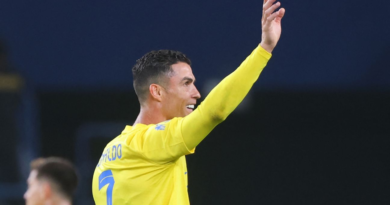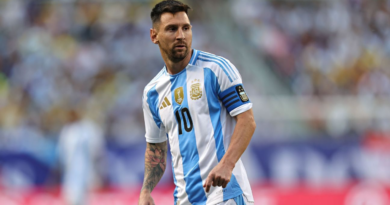Are sports betting scandals proving cynics right?
Ever since the U.S. Supreme Court cleared the way for legalized sports betting in 2018, doomsayers have warned that the proliferation of wagering options — both legal and illegal — would bring an inevitable wave of scandal to sports. For the past year, at least, they appear to have been correct.
Since the beginning of March alone, betting-related controversies have swept through sports. A former Jacksonville Jaguars employee was sentenced to 6½ years in prison after pleading guilty to stealing $22 million from the team and wagering with it on FanDuel and DraftKings.
Then, the Los Angeles Dodgers fired Shohei Ohtani’s interpreter, Ippei Mizuhara, in the wake of media inquiries about $4.5 million in wire transfers sent from Ohtani’s bank account to a Southern California bookmaking operation under federal investigation. Ohtani has accused Mizuhara of stealing from him, and there’s no evidence his former interpreter bet on baseball. Mizuhara said that he previously had placed bets via DraftKings and assumed bets placed through the bookmaker were legal.
And Monday, ESPN reported that Toronto Raptors forward Jontay Porter is under investigation by the NBA following multiple instances of prop betting irregularities over the past several months.
“This is a nightmare for the leagues,” said John Holden, a professor at Oklahoma State University whose research focuses on sports law, management and betting. “Not only is everyone asking questions because of the spotlight of the Ohtani story, but now you have very suspicious playing time, injuries tied to these flagged betting interests [surrounding Porter]. … [It] raises questions about, ‘OK, what else is going on?'”
The betting industry has exploded since 2018. According to the American Gaming Association, the industry’s trade association, gross gaming revenue (GGR) for sports betting climbed to $10.9 billion in 2023, a 45% increase from the previous year alone.
The leagues have since embraced partnership and sponsorship deals with sportsbooks. The NBA, MLB and NHL each partnered with a sportsbook in the months following the 2018 Supreme Court decision. In 2021, the NFL partnered with DraftKings, Caesars Entertainment and FanDuel. The same year, the NBA announced expanded partnerships making DraftKings and FanDuel “co-official sports betting partners of the NBA.” And in spring 2023, the MLB announced a multiyear partnership with FanDuel “making its industry-leading sportsbook a co-exclusive Official Sports Betting Partner of MLB.”
“Every league that is in partnership with gambling operators and integrating all of this is putting someone at risk, because the more access you have and the more acceptable [betting] is, the more likely you are to start,” said Lia Nower, director of the Center for Gambling Studies at Rutgers University.
In August, ESPN signed a licensing deal with Penn Entertainment to create ESPN BET, a sportsbook for audiences in the U.S.
With legalized sports betting has come a handful of high-profile scandals in sports, not just in the professional leagues, but in college athletics as well. Temple University said this month it will review reports that show at least one game involving its men’s basketball team has been flagged by gambling watchdog company U.S. Integrity for unusual betting activity.
In May of last year, the University of Iowa and Iowa State said they were investigating dozens of athletes suspected of violating NCAA betting rules. About two dozen of those athletes faced criminal charges for registering accounts on mobile sports betting apps using different names; most of the athletes pleaded guilty to underage gambling and paid fines.
Additionally, the NCAA announced last month that the former head baseball coach for the University of Alabama knowingly provided information to a gambler who bet against the Crimson Tide in a game last spring. The coach was fired last year, and the school received three years probation and paid a $5,000 fine.
In June 2023, the NFL suspended three members of the Detroit Lions indefinitely for betting on NFL games the previous season. An offensive tackle on the Tennessee Titans was also suspended for six games for betting on other sports at the workplace. At least 12 NFL players have been suspended for violating the league’s gambling policy since 2018.
And in January 2023, ESPN reported that a suspended MMA coach was an agent for an offshore bookmaking operation for years.
Each league has set rules around player and employee betting. In the MLB, personnel are allowed to bet on anything not related to baseball; for bets placed with illegal bookmakers, punishment is at the commissioner’s discretion. Similar rules exist for the NBA: Anyone affiliated with the league cannot bet on the NBA or any of its properties, including the WNBA, G-League or Basketball African League, but can gamble on other sports if legal. The NFL has the strictest rules. While players are allowed to bet on non-NFL events with legal sportsbooks, all other league personnel are prohibited from all sports betting. In the NCAA, wagering on any sport sponsored by the association is prohibited.
“Like everybody, we’re trying to learn and educate, make sure that all of our personnel — not just players, it’s all of our personnel — understand the policy,” NFL commissioner Roger Goodell said at a news conference Tuesday. “We’ve long said that the integrity of the game is number one and it still is. … Our folks understand that in that room, they understand the risk, and we will continue to remind other personnel that aren’t in the room and continue our education efforts.”
While the latest controversies have brought a fresh round of scrutiny, sports betting scandals are nothing new. The 1919 “Black Sox” incident resulted in the banishment of eight Chicago White Sox players over allegations they fixed that year’s World Series. Former Cincinnati Reds player and manager Pete Rose was banned from baseball in 1989 for betting on games. But representatives for the gambling and gaming industry argue that a legalized betting market can help detect and deter bad actors.
“The fact that the U.S. has chosen to regulate this space has significantly contributed to the prevention of scandals like this, and if they can’t be prevented, they are detected, and they can be addressed,” said Martin Lycka, senior vice president for American regulatory affairs and responsible gambling at Entain, a part-owner of BetMGM, and vice chair of the National Council on Problem Gambling’s advisory board.
Industry advocates say these scandals are coming to light not because of an increased frequency of illegal or unethical play, but because the regulators are now able to detect and flag the activity. There is no federal oversight of sports betting, and the industry is regulated by agencies and law enforcement in the 38 states and the District of Columbia that have legalized sports betting since 2018, each of whom has its own rules and regulations.
“This isn’t something where you can point the finger at one entity or one person and say, do better. It’s a collective responsibility as we build this legal marketplace,” said Cait DeBaun, a spokesperson for the American Gaming Association. “This is a nascent marketplace. And as it continues to mature, we’ll continue to build upon the regulatory frameworks.”
Groups like the AGA and Entain say offshore betting sites and illegal bookmakers like the one Mizuhara said he used are the ones that should be scrutinized and that more legalized betting would solve more problems than it creates.
But even with legalized sports betting, illegal sports wagering operators generated $40.9 billion in U.S. GGR in 2023, far outpacing that of legal U.S. operators, according to a report this month commissioned by the Campaign for Fairer Gambling.
Those who study the industry agree that legalized sports betting is the better option, but they argue the gambling lobby has too much control.
“I’m in the camp that thinks that legalizing this and creating an environment where we can supervise it and impose regulations is better,” Holden said. “We can see that there are some shortcomings there, and I think a lot of this has to do with the power of the gambling industry to basically come in and be like, ‘We’re the experts, we’ll tell you how this should happen.'”
Nower, who has studied the problem closely while at Rutgers and recently released a study on the prevalence of gambling and its effects, advocates for a federal regulatory agency similar to the Gambling Commission in the United Kingdom, which has stricter laws for the industry.
But the gambling industry has pushed back on a federal regulatory agency and expressed concern over too much regulation. The experts interviewed by ESPN said they agree that more education and awareness is key for professional league players and personnel. But industry watchers warn that even with education, the problem won’t end.
“We will see more and more of this in the coming years, and a lot of it will go undetected,” Nower said.




